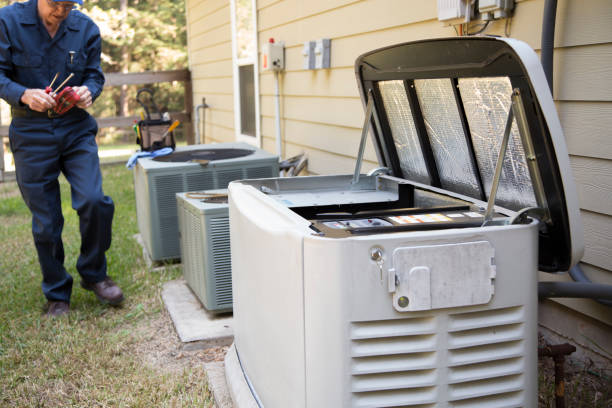Why Buy a Home Generator? 10 Reasons You Should

Looking ahead to summer—when frequent thunderstorms affect many parts of the country—you might be concerned about losing power. Or maybe you’ve just endured a long, cold winter marked by snowstorms and power outages. In either case, a generator could be a smart investment to help keep your home running year-round.
In the U.S., 78% of adults are currently concerned about rising energy prices, making it more important than ever to choose a generator that’s energy-efficient and cost-effective. In addition to keeping your home powered, a generator may also help lower your home insurance premiums.
Let’s break down the types of generators available, compare costs, and explore the top reasons to consider installing a portable or whole-home generator.
Generator Types and Sizes
Generators come in various types and sizes, so it’s essential to understand your needs before making a purchase. The three main types are portable, standby, and inverter generators:
- Portable Generators
These typically provide 5kW to 10kW of power and are best for small tasks—not powering an entire home. They’re great for camping, using power tools, or hosting outdoor events. Portable generators run on gasoline and must be operated at a safe distance from buildings. - Standby Generators
These start automatically when the power goes out and can power your entire home. They run on natural gas or propane, with natural gas usually being the more affordable fuel option. Standby generators typically provide 20kW or more of power. - Inverter Generators
Also considered whole-home generators, inverters are quieter and more fuel-efficient than standby models thanks to their more complex engines. They start automatically and offer similar power capacity. - Solar-Powered Generators
For a more eco-friendly option, solar generators store electricity for later use. These are a quieter, greener alternative, though typically less powerful.
Whatever type you choose, always follow the manufacturer’s instructions for safe operation.
How Much Do Home Generators Cost?
As of 2025, portable generators typically cost between $500 and $2,000, while whole-home systems range from $5,000 to $18,000, including installation.
Beyond the upfront cost, you’ll also need to consider operational expenses. Running a 20kW generator costs roughly $200 per day, while a 5kW generator costs around $100 per day.
Seasonal inspections—especially before winter or hurricane season—are also important and usually cost between $80 and $300.
Fuel type affects both performance and cost:
- Diesel is the most efficient but less effective in cold climates.
- Natural gas and propane are usually cheaper than gasoline and more commonly used in residential standby generators.
While the initial investment is significant, a generator can increase your home’s value and potentially lower insurance costs—helping you save over time.
10 Reasons to Consider Getting a Generator
Still unsure if a generator is worth the investment? Here are ten compelling reasons to consider one:
- You Experience Severe Weather
Weather-related outages are on the rise due to climate change. In 2024, U.S. outage minutes per customer rose by 50% compared to 2023. If you live in an area prone to hurricanes, blizzards, or storms, a generator can keep your home warm, cool, or dry when you need it most. - You Have Well Water
No electricity means no well pump or filtration system. A generator ensures continued access to clean water for drinking, showering, and cooking. - You Have a Sump Pump
Sump pumps prevent basement flooding during heavy rains. With a generator, your sump pump stays operational even during severe storms and power outages. - You Work from Home
If your livelihood depends on reliable internet and power for your devices, a generator can help you stay connected and productive during outages. - You’re Concerned About Food Spoilage
Outages lasting even a few hours can spoil meat, dairy, and produce. A generator keeps your refrigerator and freezer running, preventing waste. - You’re a Snowbird or Frequent Traveler
When away from home for extended periods, a generator offers peace of mind by protecting against issues like frozen pipes or spoiled food. - Someone in Your Household Uses an Electronic Medical Device
For households with electrically powered medical equipment, a generator can be a life-saving backup during outages. - You Enjoy Camping
A portable generator can power small appliances, fans, lights, or chargers while camping—bringing modern convenience to the great outdoors. - You Use Outdoor Power Tools
For outdoor projects requiring power tools, a portable generator provides the electricity you need—just be sure to operate it safely away from structures. - You Host Outdoor Events
Planning a party or event? A generator can keep your outdoor setup running smoothly, powering lights, speakers, and other essentials.
Still have questions about protecting your home or saving on insurance?
Speak with an independent insurance agent at C&S today to explore your options.

